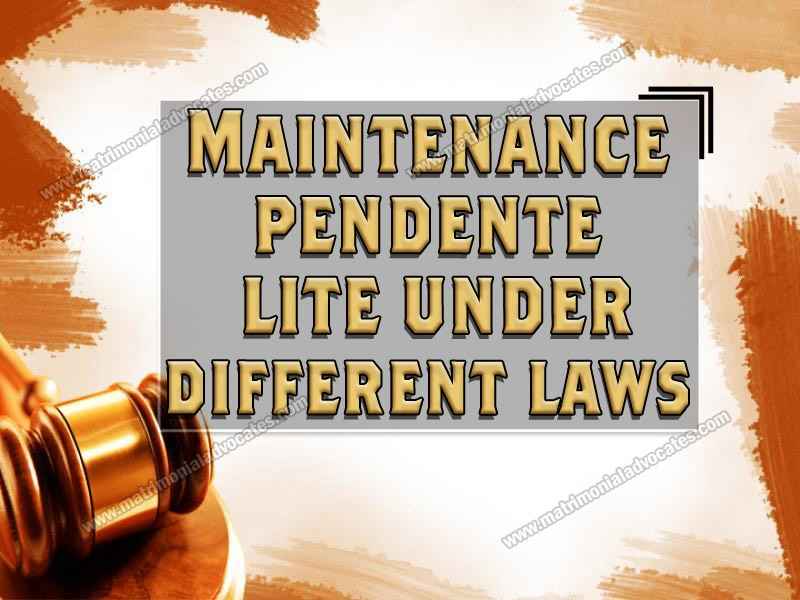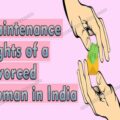
Pendente lite is a Latin term meaning “awaiting the litigation” or “pending the litigation” which applies to court orders which are in effect while a matter (such as a divorce) is pending. In divorce a pendente lite order is often used to provide for the support of the lower income spouse while the legal process moves ahead.
Maintenance pendene lite is payable during the pendency of the proceedings. The payment starts from the presentation of the application and continues till the termination of the suit. There are various matrimonial statutes in India which deals with the provisions of Maintenance pendente lite.
STATUTORY PROVISIONS
These matrimonial statutes in India incorporate provisions for maintenance penedente lite:
Section 36 of the Indian Divorce Act, 1869:
In any suit under this Act, whether it be instituted by a husband or a wife, and whether or not she has obtained an order of protection the wife may present a petition for alimony pending the suit. Such petition shall be served on the husband; and the court on being satisfied of the troth of the statements therein contained, may make such order on the husband for payment to the wife of alimony pending the suit as it may deem just: Provided that alimony pending the suit shall in no case exceed one-fifth of the husband’s average net income for the three years next preceding the date of the order and shall continue, in case of a decree for dissolution of marriage or of nullity of marriage, until the decree is made absolute or is confirmed as the case may be.
Section 39 of the Parsi Marriage and Divorce Act, 1936:
In any suit under this Act if the wife shall not have an independent income sufficient for her support and the necessary expenses of the suit, the court, on the application of the wife, may order the husband to pay her monthly or weekly during the suit such sum not exceeding one-fifth of her husband’s net income as the court, considering the circumstances of the parties, shall think reasonable.
Section 36 of the Special Marriage Act, 1954:
Where in any proceeding under Chapter V or Chapter VI it appears to the district court that the wife has no independent income sufficient for her support and the necessary expenses of the proceeding. it may, on the application of the wife, order the husband to pay to her the expenses of the proceeding and weekly or monthly during the proceeding such sum as, having regard to the husband’s income, it may seem to the court to be reasonable.
Section 24 of the Hindu Marriage Act, 1955:
Where in any proceeding under this Act it appears to the court the either the wife or the husband, as the case may be, has no independent income sufficient for her or his support and the necessary expenses of the proceeding. it may, on the application of the wife or the husband, order the respondent to pay to the petitioner the expenses of the proceeding, and monthly during the proceeding such sum as, having regard to the petitioner’s own income and income of the respondent, it may seem to the court to be reasonable.
ANALYSIS OF THE STATUTES
The Indian Divorce Act and the Parsi Marriage and Divorce Act differentiated interim maintenance and permanent maintenance by using the word ‘alimony pendente lite’ and ‘permanent alimony’. The Hindu Marriage Act and the Special Marriage Act have, however, distinguished the two by addressing them as maintenance pendente lite and permanent alimony. The expression used in HMA is generally favored.
The IDA and PMDA incorporate “one-fifth rule” of maintenance. This rigid rule has not been followed in SMA and HMA which came to be enacted subsequently. Under these no ceiling has been contemplated and the issue has been left to judicial discretion.
There is hardly any difference in other respect and the identical principle is followed in the actual working of the statutes.
OBJECT OF THE MAINTENANCE PENDENTE LITE
The maintenance pendente lite consists of personal maintenance of claimant and expenses of the proceeding. The object of maintenance pendente lite and expenses under section 24 of HMA is to provide financial assistance to the needy spouse to go ahead with the proceeding and to maintain herself.
The essential point of distinction among the statutes in dispensation of pendente lite maintenance is that , while either spouse under HMA may claim maintenance, the wife alone in all other statutes has been considered as beneficiary of this allowance.
ENTITLEMENT TO MAINTENANCE PENDENTE LITE
As already observed, Hindu Marriage Act provides the indigent spouse, husband and wife with maintenance pendente lite which other statutes extend to wife only as a matter of assistance. Under the HMA, SMA, PMDA the applicant is required to bring to the notice of the court that she does not have independent income sufficient to maintain her, as also no means to incur expenses of proceedings.
However, under IDA, she is required to establish the fact that she is needy. In the words of section 36 of the Indian Divorce Act expenses of the proceedings are not specifically spelt out. However, some authors are of the opinion that the words employed therein are wide enough to accommodate expenses of proceedings. The provisions lay stress on the independent income. It is of no consideration if the applicant owns independent property or is likely to inherit property or to receive property by way of gift or goodwill.
GRANT OF ALLOWANCE
Once the court has a prima facie case before it then it grants the relief by virtue of its exercise of discretionary power based on sound legal principles.
In Mulfan Kuwar v. Ajeet Chand 1958 RAJ 322
It was held that the discretionary power had to be based on the sound legal principles and not on caprice and humor.
TIMING FOR APPLICATION OF MAINTENANCE PENDENTE LITE
The application can be filed any time during pendency of the suit. When wife is respondent, she can seek the grant before her written statement being filed.
The Rajasthan High Court in Chagan Lal v. Sakkha Devi AIR 1974 ruled that an application for interim maintenance under section 24 HMA, as also an application for the same under any other matrimonial statute must be decided as speedily as possible but in any case before the main application is decided.
QUANTUM OF MAINTENANCE
Under the SMA, HMA, and PMDA, the moot-point before the judiciary is that claimant has no independent incomes for her support, the thrust, obviously, being on independent income. No such requirement has been demanded under IDA. Except in the IDA and PMDA none of the Indian matrimonial statutes specify the quantum of maintenance and expenses of the suit. Non-specification of quantum does not mean the bare maintenance. The courts have recourse to the discretion based on some established principles.
Dinesh v. Usha, AIR 1979 Bom173
The husband was living in six-member family with a net total income of Rs. 2020/- per month. The court made an award of Rs 350/- per month as wife’s maintenance. Criticising the rule Deshpande, J. observed that
“The husband was unable to trace any rational basis on the one-fifth rule, even when wife’s needs and capacity of the husband warranted awarding large amount. This amounted to almost rule of thumb. Such a rule in the Indian Divorce Act, 1869 might have been based on the then notions and concepts~ to women’s status and position in society. But in our contemporary society this rule is not only unreasonable and irrational but also cuts the very root of the principle of equality of sexes. It militates against the concept of reasonableness, which is the basis for awarding interim maintenance.
P.S. Krishna Murthy v.Uma Devi AIR1987 AP 237
The Andhra Pradesh High Court compared the maintenance pendente lite provisions of IDA and HMA to conclude that the section 24 of the latter Act gives equal right to either spouse to claim maintenance whereas section 36 of IDA extends right to alimony pendente lite to wife only and that too, to a maximum of ‘one-fifths of husband’s net income. It is to be noted here that though the wife may have sufficient income for her maintenance, yet she is entitled to claim under the law. On the other hand a Christian husband is not entitled to similar rights as the Hindu husband. The Christian husband may complain of discriminatory treatment. Section 24 is, on the face of it, more reasonable and beneficial to the parties. It is devoid of offensive discrimination.
EXPENSES OF THE PROCEEDINGS
Pending the suit the wife can claim the maintenance as well as “necessary expenses of the proceedings”. The object of the provision is to ensure that the party is provided with sufficient funds to meet the expenses of suit. “The expenses of the proceedings has wide meaning and includes in its ambit the reasonable fees of a lawyer, process fees, court fees, expenditure incurred in course of securing services of witnesses, getting papers prepared, typing, Xeroxing charges etc.
Prili Parihar v. Kailash Singh Parihar, 1975 HLR 480.
The court held that if need arose subsequently, the court had the jurisdiction to grant additional expenses- in excess of what was originally sanctioned.
ENFORCEMENT OF ORDERS
Apart from the Civil Procedure Code, the courts have recourse to other methods for enforcement of such orders.
In Narinder Kaur v. Pri1am Singh (1985) 1 DMC 181 (Del.) along with a suggestion by the court, of disciplinary action against the employed husband, the court punished the husband for contempt and sentenced him to a term of four months for denial of the order to pay maintenance pendente lite.
Anita Karmolrar v. Birendra Chandra Kannokat AIR 1962 Cal.88
The Calcutta High Court in this case observed that it was a strictly permissible step to stay the proceedings of the petitioner in the event of husband’s non-compliance of order to pay maintenance pendente lite and expenses. Section 151 of Civil Procedure Code vests the court with this power.
Yaqub Masih v. Christina Masih AIR 1941 All 93
Under the Indian Divorce Act the Court in this case heldthat until the wife’s entire taxed cost was realised, the court had the jurisdiction to stay all further proceedings by the husband.
EFFECT OF NON COMPLIANCE OF ORDER ON PENDING APPEAL
Banso v. Sarwan (1978) HLR 251 P & H.
The Punjab and Haryana High Court ordered the husband for payment of maintenance pendente lite on wife’s preferring an appeal after her petition for judicial separation was dismissed by the court below. The husband disobeyed. On this ground the High Court allowed the appeal.
CONCLUSION
There are various matrimonial statutes which deal with the provision of maintenance pendente lite in India. The Indian Divorce Act and Parsi Marriage and Divorce Act incorporate “one-fifth rule” of maintenance. However under Hindu Marriage Act and Special Marriage Act this rule is not followed, since the issue has been left to the discretion of the court. When it comes to object and entitlement of the maintenance pendente lite the needy wives are entitled to get the maintenance under all these statutes, the only difference being that under Hindu Marriage Act any of the needy spouse can claim for maintenance .Hence the husband may claim maintenance under section 24 of the HMA, while in other matrimonial statutes it’s the wife only who is entitled to get the maintenance. There is hardly any difference in other respect and the identical principle is followed in the actual working of the statutes.
The aforesaid study of various matrimonial provisions clearly reveals that laws enacted by the Legislature are quite in place.





